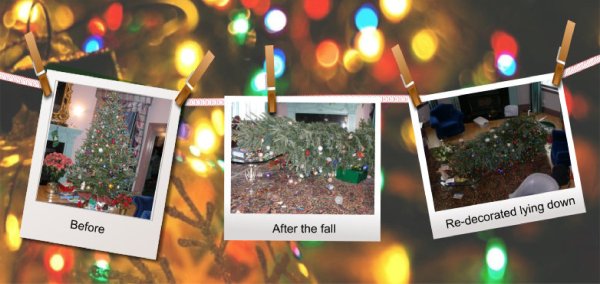 The expectations we create around the holidays tend to make us more vulnerable around our most sensitive issues, from wanting things to be perfect to worrying about what other people think of us, or feeling ‘not good enough.’ We are surrounded by Hallmark images of happy family celebrations where everyone is thrilled to see everyone else, the food is perfectly prepared, and the ideal gifts have been gotten for everyone.
The expectations we create around the holidays tend to make us more vulnerable around our most sensitive issues, from wanting things to be perfect to worrying about what other people think of us, or feeling ‘not good enough.’ We are surrounded by Hallmark images of happy family celebrations where everyone is thrilled to see everyone else, the food is perfectly prepared, and the ideal gifts have been gotten for everyone.
If you don’t practice Christian traditions, Christmas can make you feel marginalized as can New Year’s Eve if you don’t have a partner. If you have lost someone you love, times of celebration are painful reminders of that loss. If you are alone, whether through circumstances or your own choice, all the talk of and images of ‘togetherness’ can make you feel more lonely. This time of year can bring into focus that none of us is perfect or has the perfect family.
 The cultural focus on the holidays brings up the disparity between idealized images and the reality of our lives, which can create disappointment, sadness and longing. In reality, we can’t figure out the right gift, or we can’t afford it without causing financial stress. Someone comes to the party late, holding up dinner, someone else gets drunk, and despite being told many times you have a scent-sensitivity, your sister gives you cologne. Someone re-gifts you with what you gave them last year, and Uncle Joe comes out with a totally insensitive comment. Your mother complains about what a short time you are staying, and the pie you made is burned. You may come away feeling angry because it feels like you do all the work, or disappointed and discouraged because your are ‘not as good as cousin Donna’, or it seems you can never please your partner/parent/child, or you may feel sad and lonely because no one really understands who you are or appreciates all you do.
The cultural focus on the holidays brings up the disparity between idealized images and the reality of our lives, which can create disappointment, sadness and longing. In reality, we can’t figure out the right gift, or we can’t afford it without causing financial stress. Someone comes to the party late, holding up dinner, someone else gets drunk, and despite being told many times you have a scent-sensitivity, your sister gives you cologne. Someone re-gifts you with what you gave them last year, and Uncle Joe comes out with a totally insensitive comment. Your mother complains about what a short time you are staying, and the pie you made is burned. You may come away feeling angry because it feels like you do all the work, or disappointed and discouraged because your are ‘not as good as cousin Donna’, or it seems you can never please your partner/parent/child, or you may feel sad and lonely because no one really understands who you are or appreciates all you do.
The difference between idealized holiday images and our reality may be one reason this time of year is known for high levels of depression. I love this quote from addiction circles:
“Expectations are planned disappointments and premeditated resentments.”
Enough about Problems, Let’s Get to Solutions!
- Let go of your expectations for the holidays, for other people’s behaviors and for perfection. Then you can’t be disappointed!
- Accept that being human means being imperfect.
- Release judgments of good and bad. Be open to whatever happens. Try responding with “How interesting!” rather than with judgments.
- Look for what you can do to enjoy this moment, even if it is a burned dinner, a snowstorm that interferes with travel, or a fallen Christmas tree.*
- Focus on what you control – look for what you CAN do, not on what isn’t in your control. (You don’t control what others do, who is missing from your life or table, or the past).
- Change the stories you are telling yourself if you aren’t happy.
- Appreciate what is GOOD in your life, right now. If you focus on what you HAVE in your life, you will feel satisfaction and abundance. If you focus on what you WANT or what is missing, you will feel sadness and scarcity.
- When you feel sorry for yourself, think of people who have a heavier burden than you do.
- If someone you love isn’t with you for the holidays, remind yourself how lucky you are to have people you love in your life.
- If you are feeling lonely, think of someone else who may be lonely, and reach out to him or her, whether it is a friend, neighbor, or going to a nursing home, hospital, or homeless shelter. Ask others about their lives. You will be amazed by how being kind and showing interest in others improves YOUR state of mind!
- Remember that other people’s behavior is more about them than about you. Don’t take it personally!
- When a should comes up – whether I should invite or call so-and-so, or I should clean up tonight, ask yourself what the consequences will be if you don’t do it. Are you willing to live with those consequences or do they make you WANT to do it?
- When you get caught up in shoulds, look at what would happen if everyone did what they enjoy doing, rather than trying to please everyone else. Would the total happiness level be increased?
- Being generous generally makes the giver feel happier. Give – whether time, attention or material things – without expectations about how your gifts will be received.
- What do you really, really, REALLY want? How will you ask for or create it?
- How do YOU want to experience this day or this season, given the reality of your situation? What are YOU going to do to create that experience for yourself?
- We are responsible for our own experiences. Your beliefs, actions and attitudes affect how you feel about your life, so start creating the stories that make you happy!
*My Story
My Christmas goal used to be to make everyone happy. I wanted to give each recipient – from my parents and partner to my siblings, nieces, nephews and friends – the best gift they had ever received. My gifts had to show how well I knew each person and his or her desires, and they had to be the perfect. This led to excess. There were years I averaged 5 gifts per person for 15 – 20 people on my list with another 5 or so people who would get one perfect gift. Then I would carefully wrap each item, with beautiful papers and special ribbons, and write the perfect phrasing on the gift card. My family of origin lives all over the country, so there were stacks of boxes taken to UPS or the post office.
I like putting a personal note on each Christmas card, I have beautiful Christmas tree ornaments I’ve been collecting since I was 15, and I like to send food gifts. I tend to be a procrastinator, so I am always up against mailing deadlines, which leads to late nights, and overspending on shipping – which wouldn’t have been budgeted, leading to financial stress. I would berate myself for finishing things at the last possible minute, and I would enter the celebrations sleep-deprived. I believed the path to feeling worthy of love, and therefore happiness, was to give everyone else just what they wanted for Christmas. Yes, I was a codependent perfectionist.
In 2007 I finally finished decorating the Christmas tree on Christmas Eve (not because of tradition, but because I was busy mailing gifts and cards before that). Around 1 AM Christmas morning there arose such a clatter – a big thump accompanied by the jingle of bells and shattering glass. No, it wasn’t Santa. I knew in a moment it was the sound of a falling Christmas tree. We sprang from our bed and flew downstairs (after pausing to put on shoes, knowing there was broken glass) to make sure the ‘disaster’ wasn’t getting worse due to water sitting on the floor and soaking into the Persian carpet, or the possibility of the tree lights igniting a fire. The stand was still upright, so no water spilled, but the tree had gone horizontal. Deciding the mess could wait until morning, we put a wet towel over the base of the tree to keep it from drying out and went back to bed.
In the morning we reviewed the options as I swept up the broken ornaments while honoring the history of each of them in my life. Righting the tree would require taking everything off the tree, putting the tree back in a stand (always a stressor to our marriage) and redecorating it. I was afraid the tree would fall again (it turns out the trunk was split), so we thought of moving it out to the deck, and just putting lights on it. I finally opted to leave the tree where it was after making sure we had vacuumed up all the broken glass which would put the children and dog coming the next day at risk, and redecorated the tree to look the best it could in its prone position. When my cousins arrived for Christmas dinner, we shared the new look, and because I hadn’t tried to do too much by up-righting the tree, I could enjoy their company and dinner was on time. We even turned the whole episode into our Christmas card for 2008!
Lessons
- Things don’t always go as you expect them to, so let go of your expectations.
- You might have some responsibility for what happened. It is human to make mistakes and is it wise to learn from them.
- Accidents happen, and it is fine to cry over your losses, but it doesn’t do any good to wish things were the way they used to be. Accept the new reality.
- Look at all your options for going forward. Get creative. Review the consequences of each option. Decide which one will make you happiest.
- Choose happiness!
If you ask for what you want,
and accept what you receive,
you will get what you need.

